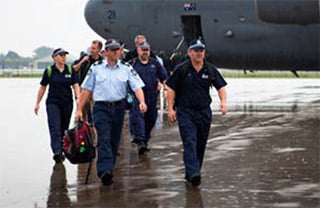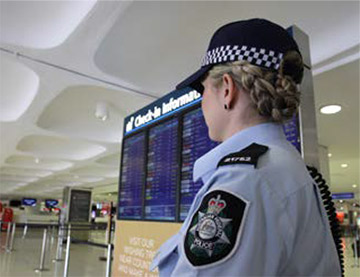Our Operations
AFP operations are divided into two programmes, Federal Policing and National Security, and International Police Assistance, as per the PBS 2015-16. Policing strategies within these programmes consist of prevention, detection, disruption and response activities, either independently or in partnership.
Programme 1.1 Federal Policing and National Security
The Federal Policing and National Security Programme addresses criminal and security threats through a range of activities including national and transnational investigations, counter terrorism, aviation operations, protective services and joint taskforces with international, Commonwealth, state, territory and private-sector partners.
Figure 3. Programme 1.1 estimated budget| Federal Policing and National Security | |||||||||||||||
|---|---|---|---|---|---|---|---|---|---|---|---|---|---|---|---|
| Programme objective: Promoting the safety and security of the Australian community and infrastructure; preventing, deterring, disrupting and investigating serious and organised crime and crimes of Commonwealth significance; and ensuring effective collaboration with international, Commonwealth, state and territory partners. |
|
||||||||||||||


The main components of Programme 1.1 are described below.
Federal Policing

This area comprises Organised Crime and Cyber Crime, Crime Operations and International Operations, which together provide an investigative capacity for a wide range of crime types contained in Commonwealth statutes. The purpose is to disrupt, dismantle and combat serious and organised crime that poses a threat to Australia.
It also includes a range of joint taskforces with Commonwealth, state and territory and private sector partners (including the Criminal Assets Confiscation Taskforce, Serious Financial Crime Taskforce, Joint Anti Child Exploitation teams and the National Anti-Gangs Squad) and a virtual global taskforce dedicated to preventing cybercrime and educating the public of the risks and actions they can take.
This programme is supported by the AFP international network, which consists of nearly 100 officers in 30 countries. Their role is to maintain and enhance cooperation on matters of mutual strategic and operational interest to both Australia and the host country, including capacity building with host country agencies and the foreign law enforcement community.
National Security

This consists of Counter Terrorism, Aviation and Protection services that focus on preventing and combating national security threats.
Counter Terrorism conducts investigations and disruption activities in collaboration with the Australian intelligence community and international law enforcement partners. The focus is on those wishing harm on Australian nationals. In particular, effort is placed on mitigating the threat posed by the increasing number of Australians who travel overseas to participate in training and provide support to terrorist groups, or to fight in conflict zones.
At Australia’s major airports the AFP delivers counter-terrorism first response, investigation, intelligence and community policing capabilities. Specifically, AFP members at airports conduct criminal investigations into aviation-specific crime, maintain a highly visible patrolling presence, respond to community policing incidents and conduct incident-preparedness exercises.
The third element to national security is the delivery of protective security services to individuals and interests identified by the Commonwealth to be at risk from acts of terrorism, safety and issue-motivated violence. Protective security services include uniform patrols and response, close personal protection and special events planning. They also provide capabilities designed to respond to armed incidents and increased threat levels.
Specialist and supporting capabilities
A range of support and specialist functions provides vital assistance to AFP operations. These include coordination and communication support, witness protection services, forensics, intelligence, covert policing capabilities, legal, litigation, security, technical and physical operations.
Measuring Programme 1.1 Performance
We will measure our performance through the indicators in Figure 4 below. Further information on these indicators and an associated range of deliverables can be found in the AFP PBS 2015-16, accessible at the Attorney-General’s Department website, www.ag.gov.au/budget16.
The key performance indicator targets shown are applicable for all years, 2015-16 to 2018-19.
Figure 4. Programme 1.1 key performance indicators and targets 2015-19| Key Performance Indicators | Target |
|---|---|
| 1. Level of external client/stakeholder satisfaction (percentage of clients satisfied or very satisfied) | 85% |
| 2. Percentage of cases before court that result in conviction | 90% |
| 3. Percentage of counter-terrorism investigations that result in a prosecution, disruption or intelligence referral outcome | 90% |
| 4. Level of community confidence in the contribution of the AFP to aviation law enforcement and security (percentage of aviation network users satisfied or very satisfied) | 75% |
| 5. Response to aviation law enforcement and /or security incidents within priority response times (a) | 75% - 90% |
| 6. Number of avoidable incidents per 5,000 Protection hours (b) | <4 |
| 7. Return on investment for investigation of transnational crime | >1 |
| 8. Assets restrained (c) | Increase |
| 9. Increased or reinforced cyber safety and security awareness (percentage of surveyed sample indicating increased awareness or reinforced awareness after delivery of presentations) | 85% |
